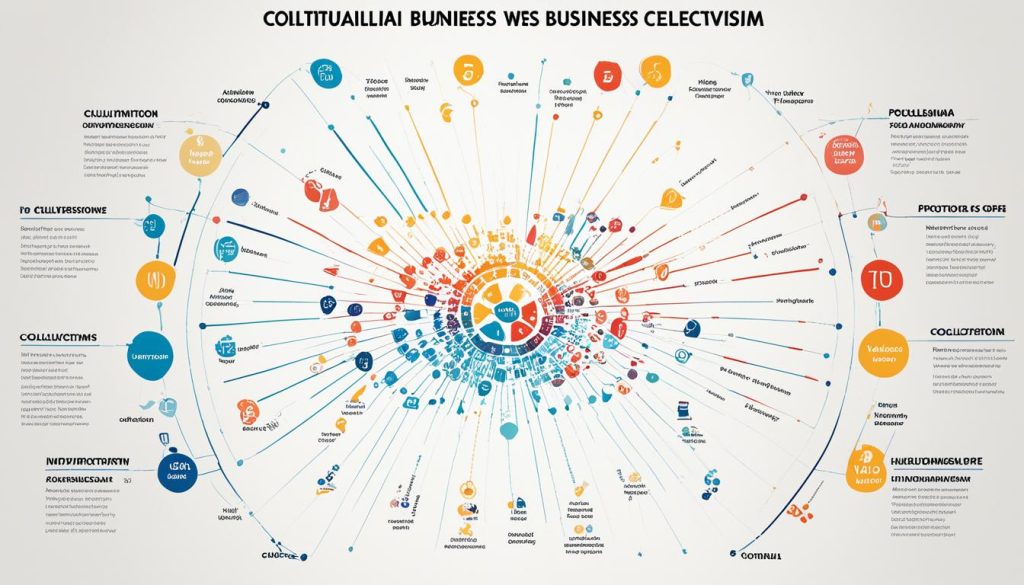Understanding how different cultures affect the workplace is key to success in today’s global market. The way the USA, Australia, and Portugal do business highlights the impact of cultural differences. These countries show unique business styles due to their traditions and regional behaviours.
Differences in communication and management are central to these variations. Looking at high-context and low-context cultures helps us understand these differences. This is crucial for companies operating internationally. The direct approach of the US and Australia contrasts with Portugal’s more nuanced style. This difference offers valuable lessons for global businesses.
Understanding Cultural Dynamics in Global Business
Navigating intercultural communication is crucial in today’s globalised market. It’s key for success in various cultural settings. Direct and indirect communication styles are important to understand. By understanding these, we can improve business talks and handle cross-cultural differences better.
High-Context vs Low-Context Cultures
In high-context cultures, non-verbal cues are crucial. Found mostly in Asia, these societies rely on body language, tone, and status. This indirect style uses shared knowledge to convey messages, lessening the need for spoken instructions.
Meanwhile, low-context cultures in the West, like the USA and Australia, prefer direct communication. They focus on clear, articulate talking. Intentions and expectations are made clear, avoiding confusion.
- Using non-verbal signs to send complex messages
- Using a mediator for delicate information
- Accepting ambiguity for flexibility and meaning
- Valuing spoken or written words in deals
- Being direct about issues or unhappiness
- Stressing individual independence and clear chats
The Role of Communication Styles
It’s vital to grasp direct and indirect communication in different cultures. High-context settings need patience and care. This means looking beyond words to the context for understanding.
In contrast, low-context cultures thrive on straightforward communication. This clear style helps in quick decisions and solving problems easily. It makes international business more transparent.
- Look for unspoken clues in discussions.
- Keep respect and harmony in talks.
- Prefer building relationships to mere transactions.
- Put honesty and clearness before politeness.
- Promote open talks and quick feedback.
- Stress the importance of written agreements.
Learning these communication styles is key to overcoming cultural barriers. It makes global business work better together. As the world’s markets merge, adapting these skills is essential for global success.
Comparing Corporate Communication in the West
In the heart of Western business, a high value is placed on corporate communication. This focus is directly connected to the straightforward style of countries like the USA and Australia. Here, the business norms in the West embrace clear and concise talks, shaping the corporate culture.
Good communication in these areas often means face-to-face interactions. This approach is prized for making things clear and getting quick responses. It shows how much Western companies value open and honest conversations at work.
Corporate communication in the West prefers clear talks. Meetings are well-organized, leading to deep discussions. This way, problems can be spotted and solved by talking openly and positively. It shows that being truthful at work is key. It also shows that through active discussions, companies can tackle issues well.
- Embracing openly confrontational but constructive dialogue.
- Encouraging straight-talking and candid exchanges.
- Deciphering the value of efficient and clear communicative measures.
- Observing the impact of these practices on inter-departmental synergy.
- Distinguishing between mere transactional exchanges and the cultivation of meaningful corporate relationships.
Western business practices clearly show how to deal with company matters. These practices not only shape company strategies but also reflect Western values. Values like honesty and integrity shine through in all business dealings.
Navigating Business Relationships Across Borders
Success in international business lies in making strong partnerships and knowing how to negotiate. This is true whether you’re dealing with the fast-paced markets of the USA and Australia or the slower business rhythm of Portugal. It’s all about creating solid networks.
Building Trust in International Partnerships
Trust is key in global business, especially when moving beyond your own country. In the US and Australia, being open helps build this trust quickly. Deals are made fast here, helping businesses move forward quickly. Trust grows from being predictable and reliable.
In places like Portugal, building trust takes longer. It mixes personal ties with old traditions. Their way of negotiating can be complex. It focuses more on personal connections and the history between people.
The Speed of Business: USA and Australia vs Portugal
The speed of doing business changes across cultures. In the USA and Australia, decisions are made quickly to stay agile. Their style of negotiation is quick, clear, and aims for fast results.
Portugal, however, takes a slower approach. Every step is carefully thought out and considered. This method values non-verbal cues and understanding the subtle social and economic contexts.
To succeed globally, businesses must adjust their methods. This helps them build lasting relationships and be successful worldwide.
Leadership and Hierarchical Structures in Business
The way effective business leadership changes to fit different cultures is key. In the UK and much of the West, businesses prefer egalitarian hierarchies. Leaders here act more as guides, empowering employees to take their own initiatives.
This style is different from the rigid structures seen elsewhere. In the West, businesses like a flatter structure that views leadership as teamwork. This idea strengthens the view of leadership across an organisation. It shows that everyone’s ideas are important for achieving common goals.
- Leadership styles in Western businesses tend to encourage autonomy and promote transparency, facilitating a two-way dialogue between leaders and team members.
- While hierarchical structures exist, the role of job titles and ranks may be less pronounced, positioning everyone on a more equal standing.
- Business leadership in these contexts is often evaluated by the leader’s capacity to inspire, guide, and develop, as opposed to simply exerting authority.
- Leadership perceptions include viewing failure as an opportunity for learning and development, further boosting innovation and progressive problem-solving.
Globally, leadership can look quite different. In some places, leaders stick to traditional hierarchies focusing on position. Here, leadership is more about command and ensuring respect based on position.
This approach reflects a deep cultural view of leadership, where following the hierarchy is most important.
- Authoritative leadership styles may hinge on adherence to established protocols and formality within interactions.
- In such hierarchical structures, positions dictate communication flows, with information typically cascading down from senior leadership.
- Leaders are expected to exhibit decisiveness, and their authority is rarely questioned, upholding distinct leadership perceptions.
- Business leadership in these settings may also focus on collective goals, yet individual roles are clearly defined by their hierarchical position.
Understanding the different leadership styles and structures is essential for global business. Recognising these differences helps businesses succeed in various cultures. It’s about adapting to the way leadership is seen around the world.
Punctuality and Time Management Differences
In the world of global business, punctuality and time management are key. Western work environments tend to be more flexible about time. This reflects a belief that outcome matters more than strict time keeping.
In places like the USA and Australia, being on time is valued. Yet, they approach it with a practical mindset. Here, as long as teams achieve good results, watching the clock closely isn’t seen as critical. This approach allows for a more flexible and dynamic way of managing time at work.
However, in high-context societies, punctuality is taken very seriously. Being on time shows respect and professionalism. It signals your dedication to the business and its activities. This keen awareness of time shapes the entire work culture in these places.
- Punctuality goes beyond just showing up on time; it’s crucial in professional timing, reflecting a careful approach to managing time.
- The importance placed on others’ time affects business etiquette, shaping how meetings are planned and how businesses operate.
For businesses working internationally—in the USA, Australia, and Portugal, for example—understanding these time-related differences is essential. It helps in forging successful global partnerships. It also shows the wide range of corporate cultures around valuing time, punctuality, and coordinating business tasks.
In international business, grasping the nuances of punctuality, time management, and work culture is crucial. This understanding prepares professionals for deeper interactions. It creates an environment of mutual respect, crucial for success in the global business scene.
The Significance of Asking Questions in Business Settings
In the world of international business, how we ask questions matters a lot. Knowing the differences helps build strong relationships and keeps everyone curious. In some places, asking questions shows you’re eager to learn. But in others, people might see it with suspicion because of different cultural views on learning.
Cultural Norms Surrounding Inquiry and Learning
When we talk worldwide, culture shapes how people see questioning. In many Western countries, asking a question starts a good conversation. It shows you’re thinking and want to grow. Yet, some cultures might see this as questioning their methods. This means we need to be careful and respectful of these differences to make the most of asking questions in business.
Perceptions of Proactiveness in Different Cultures
What some see as eager learning, others might not see the same way. In cultures that rely heavily on context, lots of questions could seem rude. Meanwhile, cultures that are more direct might see it as being thorough and involved—which is great for keeping the workplace interested. So, knowing when and how to ask questions is really an important skill that needs thought and understanding.
- Analyse the audience and setting before engaging in question-asking to ensure alignment with cultural norms.
- Encourage an environment where proactive learning is associated with positive outcomes and innovation.
- Use question-asking as a tool to bridge cultural divides, demonstrating respect for various learning attitudes.
- Foster workplace curiosity through structured opportunities for employees to engage in open dialogue.
To wrap up, being aware of and adjusting to different cultural views on learning and asking questions is key to success. It turns people into drivers of growth and new ideas. Plus, it highlights why keeping curiosity alive at work is so vital for a company’s culture.
Analyzing Hofstede’s Cultural Dimensions Theory
In today’s global economy, understanding Hofstede’s cultural dimensions is vital. His research helps companies tackle international markets. It makes adapting business strategies to different cultures easier.
Assessing Power Distance and Individualism
Hofstede’s idea of power distance looks at how people in organizations view power inequality. Countries with high power distance often have strict hierarchies. In contrast, countries with low power distance value equality and fair opportunities. This affects how companies operate globally.
The concept of individualism vs collectivism examines if a society values personal success or group achievement. In individualistic societies, people focus on their own gains. Collectivist societies value teamwork and group success more. Knowing this helps businesses communicate better internationally.
Evaluating Masculinity vs Femininity and Uncertainty Avoidance
- Masculinity vs femininity: This looks at gender roles in society and work. Some cultures value assertiveness and competition, while others prefer cooperation and kindness. Understanding this helps adjust management and negotiation styles.
- Uncertainty avoidance: It explores how cultures deal with uncertainty. Societies with high uncertainty avoidance like strict rules. Those with low avoidance are more open to taking risks and innovating. This shapes how companies plan and operate.
Using Hofstede’s cultural dimensions gives companies an edge in the global market. It improves cross-cultural understanding and makes international strategy more effective.
Business Etiquette: USA, Australia, and Portugal
Understanding business etiquette is key in different cultures. In the USA and Australia, people value clear and direct talks. Meetings focus on being productive, sticking to plans to avoid confusion. This way of working shows the importance of being open and quick in business.
In Portugal, the focus is on personal connections. Meetings dive deep into the meaning behind words and actions. It’s not just about what you say but also how and when you say it. This shows respect and understanding of the local business ways.
- Open dialogues respect cultural sensitivities and establish common ground.
- Cultivating strong relationships before delving into contractual discussions.
- Recognition and appreciation of hierarchy within the business setting.
As business becomes more global, being flexible in etiquette and meetings is vital for success. Knowing how to act in the straightforward settings of the US or the thoughtful environments in Portugal is key. It helps in working together better.
- Paying close attention to verbal and non-verbal signals ensures respectful communication.
- Being culturally informed fosters better professional relationships and business outcomes.
- Adaptability in meeting conduct and etiquette can serve as a competitive advantage.
Understanding the balance between clear communication in the USA and Australia and the emphasis on relationships in Portugal is crucial. It sheds light on global business etiquette’s varied nature.
Corporate Social Responsibility: A Cross-Cultural View
In our times, being socially responsible is key for businesses. It’s essential to grasp the diverse CSR practices worldwide. Companies have to tailor their strategies to fit into each area’s culture. This means that how companies approach social and environmental matters varies widely across countries.
Engagement with Social and Environmental Issues
In the United States and Australia, companies actively tackle social and environmental issues. They integrate sustainability into their core activities. These efforts are shared publicly through campaigns and policy updates, focusing on climate change, the scarcity of resources, and fighting social inequality.
Comparative Analysis of National Sustainability Goals
Different countries adopt varied strategies for sustainability, influenced by their cultures. For example, US companies often chase innovation and tech solutions in their CSR projects. In contrast, Australian firms might focus more on engaging with local communities and supporting indigenous rights. Portugal prefers CSR actions that support the local community’s overall well-being and life quality.
- United States: Emphasis on innovation and cutting-edge solutions to tackle environmental challenges.
- Australia: Focus on local community engagements and support for indigenous peoples.
- Portugal: Alignment of corporate actions with community well-being and sustainability.
Understanding these differences is crucial for companies aiming to be globally socially responsible. It’s also vital for those looking to partner with ethically mindful businesses. Cross-cultural CSR practices show a dedication to ethics that align with social standards. This is shaping the future of corporate citizenship around the world.
Consumer Behaviour and Marketing Strategies
Exploring consumer behaviour shows how culture influences what people buy. In countries like the USA, Australia, and Portugal, cultural effects on purchases are crucial for marketing strategies. Companies that understand cultural values can create tailored marketing that connects with their audience.
Buyer psychology is complex. It is shaped not just by product features or prices but by cultural backgrounds. These backgrounds affect values and buying habits. Businesses need to design marketing that reflects the culture of their consumers.
- To reach people, it’s vital to know if a culture values individual success or the common good.
- Product messages might highlight achievement or prioritise quality of life, depending on cultural norms.
- Understanding how much information people need before buying can also guide marketing efforts.
How marketing strategies mix with cultural impacts on buying shows in advertising language and images. They must suit local tastes. Tapping into a community’s shared beliefs helps build brand loyalty. This is the effect of understanding consumer behaviour and using it in tailored marketing.
- Ads that use cultural symbols make stronger connections.
- Social media campaigns are shaped to fit local styles and preferred platforms.
- Events and community activities keep brands culturally relevant and emotionally engaging.
To sum up, global companies have learned that one approach doesn’t fit all in diverse cultures. Using cultural insights in marketing makes their brands more persuasive and relevant. This way, their messages resonate and are valued by their consumers.
Compare Business and culture between USA, Australia and Portugal
When businesses go global, it’s key to get international strategies right. Cultural adaptation matters a lot in the USA, Australia, and Portugal. It’s not just about knowing local culture but how it meshes with business plans.
Distinct Business Practices and Cultural Identities
Keeping cultural identity in mind is vital when entering global markets. The USA and Australia favour straight talk; Portugal values relationships more. These differences show why understanding culture is crucial for success.
Adapting Business Models for International Success
Success abroad means tweaking how things are done. Companies might need to change how they negotiate, market, and manage. These changes reflect the cultural backdrop of their new markets.
- Assess and respect local business etiquettes and communication styles.
- Develop comprehensive understanding of market-specific consumer behavior.
- Consider collaborative approaches that embrace corporate cultural identity.
Creating global strategies that understand culture leads to economic wins and lasting partnerships. Businesses must tailor their approaches for each market’s unique setting.
Influence of Legal and Economic Environments on Business
The growth and future of companies are deeply linked to the laws and money rules of the places they work. It’s key for them to understand these areas well. This helps them get ahead and make smart plans for doing business in different countries. Every place has its own set of rules which can greatly affect how a business does.
Navigating Regulatory Differences
When businesses move into new areas, they face new sets of laws. For example, the United States, Australia, and Portugal all have their own unique rules. These rules can change how a business operates and makes decisions. Knowing these differences is not just about following the law. It’s also about finding new and exciting ways to stand out.
Impact of Economic Policies on Business Culture
Economic policies play a big role in shaping how businesses act in different countries. They affect everything from investing money to hiring people. For businesses working in more than one country, it’s important to understand these policies. Doing so can help shape their success abroad.
Technological Adoption in Business: A Cultural Perspective
Bringing in advanced technology into businesses is key for growth. Yet, cultural aspects can change how technology is adopted. In the USA and Australia, businesses quickly adopt new tech. This helps them stay ahead and be innovative.
But, Portugal’s approach is more balanced. They blend tech advances with their country’s cultural values. This careful strategy considers both innovation and risk. It keeps the unique Portuguese business culture alive, while also adopting new methods.
As companies worldwide try to adapt to digital changes, culture plays a big role. For technology to be successfully adopted, firms must look at societal values. This means making strategies that fit these cultural details. Doing so can lead to better and more lasting technology use in businesses.
















